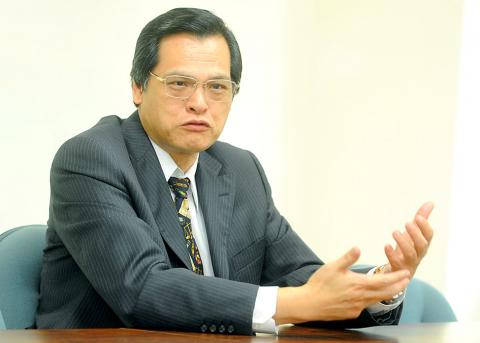|
2012 ELECTIONS:
INTERVIEW: Peace accord carries great risks
Sharing his opinions on President Ma Ying-jeou’s proposed peace accord with
China within the next decade, former Mainland Affairs Council chairman Chen
Ming-tong, currently a professor with the National Taiwan University’s (NTU)
Graduate Institute of National Development, said in an interview with ‘Liberty
Times’ staff reporter Tzou Jiing-wen earlier this month that the signing of a
peace pact under the so-called ‘1992 consensus’ would entail great risks above
Ma’s ability to handle

Former Mainland Affairs Council
chairman Chen Ming-tong speaks during an interview on Nov. 4.
Photo: Wang Yi-sung, Taipei Times
Liberty Times: What risks do
cross-strait negotiations and the signing of a peace pact pose?
Chen Ming-tong (陳明通): From Beijing’s incessant emphasis on the term
“peaceful unification,” [it suggests Beijing’s mindset that] only “unification”
would bring peace. Therefore, one of the risks of signing the cross-strait peace
accords is that Taiwan would face unification.
Beijing’s real intent is to force Taiwan to concede that “both sides of the
[Taiwan] Strait belongs to one China” via negotiation “to conclude cross-strait
adversarial status.”
Because only a war between two factions “within one country” can be called a
“civil war,” and admitting that the “civil war” is not yet over, it is admitting
that [the war can only be ended] with “one China” as the pretext. This was
stated even more clearly in the eight points made by former Chinese president
Jiang Zemin (江澤民), known as “Jiang’s Eight Points” (江八點), saying “the formal
conclusion of adversarial status between the Strait” is to “gradually realize a
peaceful unification.”
Chinese President Hu Jintao (胡錦濤) knew that he had only a limited time in office
and also understood that within the terms of his office he would not “realize
the total unification of the nation,” thus in his own statement of cross-strait
policy known as “Hu’s Six Points” (胡六點), Hu gave the definition of “peace
accords” as the following: “The political relationship under special
circumstances during the effective split of the nation.” The recognition that
the nation is “not yet unified” indicates that the pretext to the solution is
“ultimate unification.”
In other words, it is to use this pretext and force Taiwan to admit that
“unification” is the only option for both sides in the future. As for the [goal
of] “total unification under the central government at Beijing,” Beijing has all
the time to wait, and in fact it does not have to wait too long, as
[unification] could be possible within another decade or so.
When former UK prime minister Margaret Thatcher and [then-Chinese president]
Deng Xiaoping (鄧小平) signed “The Joint Declaration of the Government of the
United Kingdom of Great Britain and Northern Ireland and the Government of the
People’s Republic of China on the Question of Hong Kong” promising the return of
Hong Kong to China in 1997, the Hong Kong public then knew that it was done for
and made Beijing its “new center” (central government), and social forces in
Hong Kong made their way to Beijing. The result was that even before 1997, Hong
Kong was already under the thumb of Beijing.
If both sides of the Strait decide to sign a peace accord under the pretext of
unification, then the “new center” in Beijing would be established, and
everything from thereon can easily be imagined.
LT: Up to now, many hold the opinion that if President Ma Ying-jeou (馬英九) is
re-elected [in the January presidential election,] he would sign a peace accord.
What are your views on this issue?
Chen: Chinese Communist Party academic Xin Qi (辛旗) once wrote that
efforts should be made to sign the cross-strait peace accord before 2015, saying
that once a consensus has been reached and the accord signed, both sides of the
Strait should strive to hold to the accord and implement the accord word for
word.
Xin also said that, in particular, neither side should treat the accord
passively because of internal political factors, nor refuse to recognize the
accords or deny it completely on any grounds.
This hints at Beijing wishing to rope in Taiwan through the peace accord while
Ma is still in power, forcing Taiwan on the path of future unification and also
laying the groundwork to stop pro-independence political parties from refusing
to recognize the accords if they return to power.
As Xin comes from the People’s Liberation Army General Political Department and
even holds the rank of brigadier general, his speech completely agrees with
Beijng’s definition of the peace accord, and Taiwan should be on its guard.
Part two of this interview will be published tomorrow.
Translated by Jake Chung, Staff Writer
|
![]()
![]()
![]()